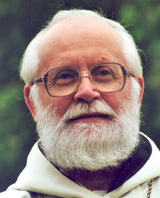 |
|
||
|
|
|||
|
May
9,
2010,
6th
Sunday
of
Easter
"C" Mississippi Abbey, Iowa, USA HOMILY When you promise
something
to
someone,
and
you
want
to
assure
that
person
that
you
will
really
do
it,
you
may
say
"I
give
you
my
word".
And,
if
you
are
a
person
of
honor,
after
you
have
given
your
word,
you
will
abide
by
that
word. But in other
occasions
you
may
express
exactly
the
same
thing
by
saying:
"I will keep my word". Paradoxical as it may be, to "give one's
word"
and
to
"keep
one's
word"
mean
exactly
the
same
thing. And, by the
way,
this
is
why
silence
is
so
important
in
the
life
of
Contemplative
prayer:
not
because
speech
is
not
important;
but
because
it
is
too
important
to
be
wasted
in
trivial
things. When I give
my
word
I
give
myself,
and
therefore
a
personal
communion
is
established
between
me
and
the
person
to
whom
I
gave
my
word. God has loved
us
so
much,
says
John,
that
he
has
given
us
His
Word.
He
has
given
it
and
has
kept
it.
He
has
given
us
his
own
consubstantial
Word,
his
Son;
and
whoever
receives
Him
and
keeps
Him
is
united
with
God. The Gospel
we
just
read
was
an
answer
of
Jesus
to
a
question
from
Judas And here is
something
interesting
for
us,
monastics.
When
Jesus
says
that
the
Father
and
He
will
come
and
make
their
"dwelling"
with
us,
the
Greek
word
used
is
"monč".
Now
"monč"
is
one
of
the
two
words
used
in
the
Greek
monastic
texts
for
"monastery"
("monč"
and
"monasterion"
are
interchangeable.
And
the
etymology
of
monastery
is
not
the
same
as
that
of
monk.
A
monastery,
etymologically,
does
not
mean
a
place
where
you
find
monks.
The
etymology
of
monč
or
monasterion
means
a
place
where
someone
dwells.
Now,
to
dwell
somewhere
is
not
the
same
as
to
be
somewhere. The meaning of dwelling implies some stability,
some
permanence,
some
satisfaction
or
pleasure.
You
dwell
in
a
place
that
you
have
made
your
own;
your
mind
dwells
on
something
that
is
important
to
you
--
or
on
someone
whom
you
love. This is what
a
monastery
is
all
about:
it
is
a
place
where
a
group
of
persons
dwell
together
on
the
same
Word
of
God;
where
they
keep
together
the
same
Word,
and
are
united
by
the
same
Spirit.
It
is
a
place,
therefore,
where
they
together
expect
the
Visit
of
the
Father,
the
Son
and
the
Spirit,
and
their
dwelling
among
them.
This
is
what
unites
us
into
a
community. Armand VEILLEUX |
|
||
|
|
|||
